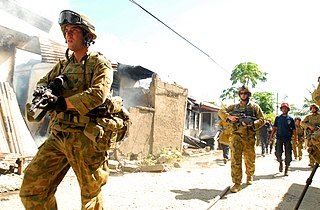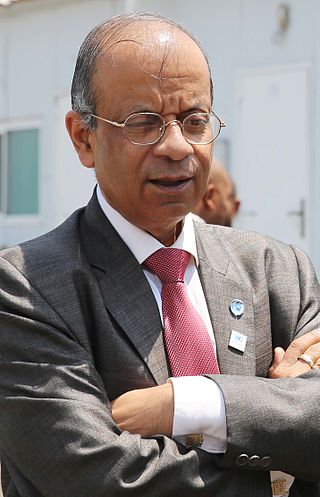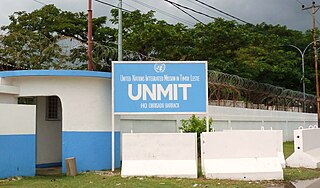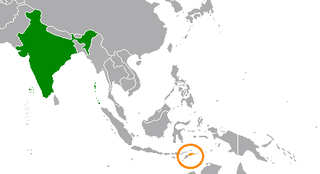Related Research Articles

The Timor Leste Defence Force is the military of East Timor. The F-FDTL was established in February 2001 and comprises two infantry battalions, small naval and air components and several supporting units.

The International Force East Timor (INTERFET) was a multinational non-United Nations peacemaking task force, organised and led by Australia in accordance with United Nations resolutions to address the humanitarian and security crisis that took place in East Timor from 1999–2000 until the arrival of UN peacekeepers. INTERFET was commanded by an Australian military officer, Major General Peter Cosgrove.

Operation Astute was an Australian-led military deployment to East Timor to quell unrest and return stability in the 2006 East Timor crisis. It was headed by Brigadier Bill Sowry, and commenced on 25 May 2006 under the command of Brigadier Michael Slater. The operation was established at the request of East Timor's government, and continued under an understanding reached between Australia, East Timor, and the United Nations, with the United Nations Integrated Mission in East Timor supporting and helping to develop East Timor's police force. Other countries deploying soldiers to East Timor include Malaysia, New Zealand and East Timor's former colonial power Portugal, operating under independent command.

The 2006 East Timorese crisis began as a conflict between elements of the military of East Timor over discrimination within the military and expanded to a coup attempt and general violence throughout the country, centred in the capital Dili. The crisis prompted a military intervention by several other countries and led to the resignation of Prime Minister Mari Alkatiri.

A United Nations Military Observer (UNMO) is a military official deployed by the United Nations to provide support to a UN mission or peace operation. Described as the "eyes and ears" of the UN Security Council, observers fulfill a variety of roles depending on scope, purpose, and status of the UN mission to which they are attached. A UNMO is generally tasked with monitoring and assessing post-conflict agreements, such as a ceasefire or armistice; the withdrawal of military forces; or the maintenance of a neutral buffer zone. Observers usually undergo special training to ensure neutrality, diplomacy, and deescalation techniques.

The United Nations Integrated Mission in East Timor (UNMIT) was established on 25 August 2006 by UN Security Council Resolution 1704. Its objectives are "to support the Government in consolidating stability, enhancing a culture of democratic governance, and facilitating political dialogue among Timorese stakeholders, in their efforts to bring about a process of national reconciliation and to foster social cohesion". In its most recent resolution on UNMIT, the Council extended its mandate until 26 February 2012. UNMIT and ISF troops left the country at the end of 2012.
Australia was one of the founding members of the United Nations (UN) in 1945 and has been actively engaged in the organisation since its formation. The UN is seen by the Australian Government as a means to influence events which directly affect Australia's interests but over which they have little unilateral control.

The Australian Service Medal is an Australian military decoration. It was authorised 13 September 1988 to recognise prescribed service in peacekeeping and non-warlike operations. It is awarded with a clasp to denote the prescribed operation and subsequent awards of the medal are made in the form of additional clasps. The Australian Service Medal 1945–1975 recognises non-warlike service prior to February 1975. The Australian Service Medal was replaced in 2012 by the Australian Operational Service Medal, except for ongoing missions.

The 1999 East Timorese crisis began with attacks by pro-Indonesia militia groups on civilians, and expanded to general violence throughout the country, centred in the capital Dili. The violence intensified after a majority of eligible East Timorese voters chose independence from Indonesia. Some 1,400 civilians are believed to have died. A UN-authorized force (INTERFET) consisting mainly of Australian Defence Force personnel was deployed to East Timor to establish and maintain peace.

Atul Khare is a career international diplomat and civil servant who currently serves as Under-Secretary-General of the United Nations in UN Department of Operational Support and previously as Under Secretary General in United Nations Department of Field Support and Assistant Secretary General for UN Peacekeeping Operations.
Takahisa Kawakami was the United Nations Deputy Special Representative of the Secretary-General for Security Sector Support and Rule of Law, United Nations Integrated Mission in Timor-Leste (UNMIT). He was appointed to this position by United Nations Secretary-General Ban Ki-Moon on 2 September 2008.

United Nations Security Council Resolution 1912, adopted unanimously on February 26, 2010, after reaffirming resolutions 1599 (2005), 1677 (2006), 1690 (2006), 1703 (2006), 1704 (2006), 1745 (2007), 1802 (2008) and 1867 (2009) in addition to noting a report by the Secretary-General Ban Ki-moon, the Council decided to extend the mandate of the United Nations Integrated Mission in Timor-Leste (UNMIT) in East Timor until February 26, 2011.

United Nations Security Council Resolution 1969 was adopted unanimously on February 24, 2011; after reaffirming resolutions 1599 (2005), 1677 (2006), 1690 (2006), 1703 (2006), 1704 (2006), 1745 (2007), 1802 (2008), 1867 (2009) and 1912 (2010) on the situation in East Timor (Timor-Leste), the Council decided to extend the mandate of the United Nations Integrated Mission in Timor-Leste (UNMIT) for a year, until February 26, 2012.

United Nations Security Council Resolution 1704, adopted unanimously on August 25, 2006, after reaffirming previous resolutions on East Timor (Timor-Leste), particularly resolutions 1599 (2005), 1677 (2006), 1690 (2006) and 1703 (2006), the Council established the United Nations Integrated Mission in East Timor (UNMIT) for an initial period of six months.
United Nations Security Council Resolution 1745 was unanimously adopted on 22 February 2007.

United Nations Security Council Resolution 1802 was unanimously adopted on 25 February 2008.
The Timor-Leste Solidarity Medal is a state decoration of East Timor awarded to international security forces for their contribution to stability and peace operations in East Timor during the INTERFET operation, and following the 2006 East Timorese crisis.

East Timor–India relations are the international relations that exist between East Timor and India. The Embassy of India in Jakarta, Indonesia is concurrently accredited to East Timor. East Timor has no diplomatic representation in India. On 7 September 2023, India has announced to open an embassy in Dili.

The logistical support of the multinational International Force East Timor (INTERFET) peacekeeping mission in 1999 and 2000 involved, at its peak, 11,693 personnel from 23 countries. Of these 5,697 were from Australia, making it the largest deployment of Australian forces overseas since the Vietnam War. INTERFET was unusual in that it was led by Australia, casting the country in a wholly unfamiliar role. The logistics and support areas of the Australian Defence Force (ADF) had been subject to deep cuts in the 1990s. The ADF had not anticipated being committed to such a large peacekeeping mission, and was unprepared to support an Australian force projection of this size, much less act as lead nation of an international coalition.
References
- ↑ UNMIT: United Nations Integrated Mission in Timor-Leste
- ↑ People's Daily Online – UN Security Council extends UN mission in Timor-Leste
- ↑ , www.defence.gov.au/opEx/global/optower/index.htm